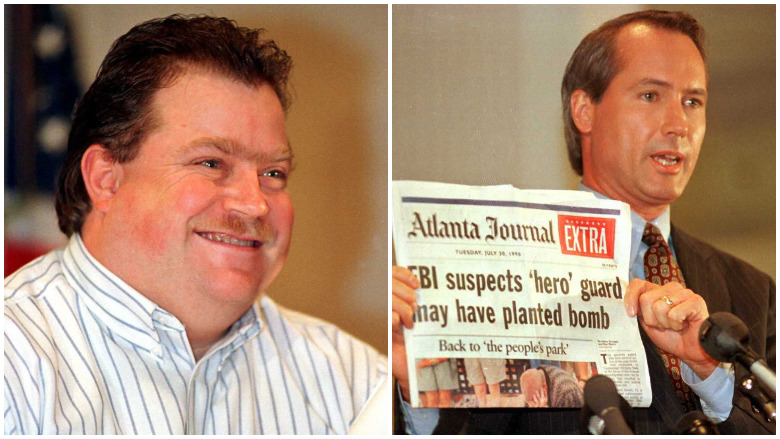
Getty Photos from the real story of Richard Jewell. The above photos show Jewell and one of his real life attorneys, Lin Wood.
The new Richard Jewell movie gets the broad outline of what happened to Jewell right – the FBI’s relentless pursuit of the hero security guard and the leak to a newspaper reporter that started a media frenzy – but some elements of the movie are fictionalized.
The lead FBI agent in the movie, Tom Shaw, for example, is not a real person, although he’s likely a composite character who does things the real FBI agents did (agents really did lure Jewell to give an interview using a training video ruse, for example).
Much has been made about the movie making it appear that the lead journalist character, Kathy Scruggs, offered to trade sex for the tip about the Jewell investigation. While Scruggs did break that story based on an FBI tip, there’s no evidence she ever traded sex for stories. Those who knew her hotly deny it.
However, the broader strokes of what happened to Jewell are accurate. He was the target of an FBI investigation and subsequent media frenzy before being completely exonerated in the Atlanta Olympics bombing attack. Small details in the movie are also accurate. Jewell’s mom’s Tupperware really was confiscated by the FBI, for example, and he really did land a job at a local police department after being cleared.
Here’s what you need to know:
Richard Jewell’s Heroism Was Real & a Witness Said Immediately That He Didn’t Think Jewell Had Time to Perpetrate the Bombing & Make the Phone Call Attributed to the Bomber
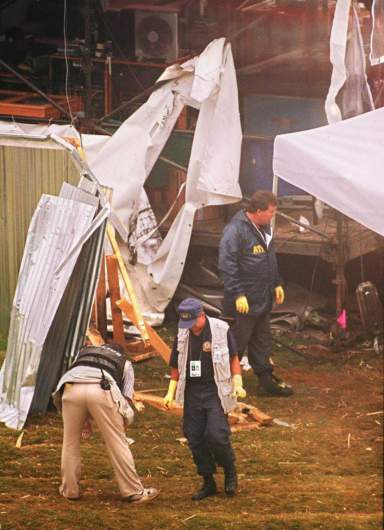
GettyThe crime scene at the Atlanta Olympics.
Richard Jewell really was the hero of the Olympic bombing. The movie’s account of the actual explosion, and Jewell’s role in discovering the suspicious knapsack containing the bomb closely follows real-life events. And it’s true, as the movie shows, that the timing pretty much exonerated Jewell from the start.
Within two days of the bombing, the media was labeling Jewell a hero. An article in the Great Falls Tribune on July 29, 1996 reported that the “most important hero of the Atlanta Olympics is a man of modest height and stocky build.” Jewell was described as the “security guard who noticed the knapsack, sitting alone by a tower. He asked the first questions about it, raised the first hue and cry to a Georgia Bureau of Investigation officer.”
The article said there were more than 150 people close to the bomb before they were moved, so it’s believed that Jewell, in real life, did save many lives.
“I’m just one person who did their job the way they were trained to do with the support of everyone else,” said Jewell, according to the newspaper. “I don’t really feel like I’m a hero. I’ve just thought, ‘I’m glad I was there.’”
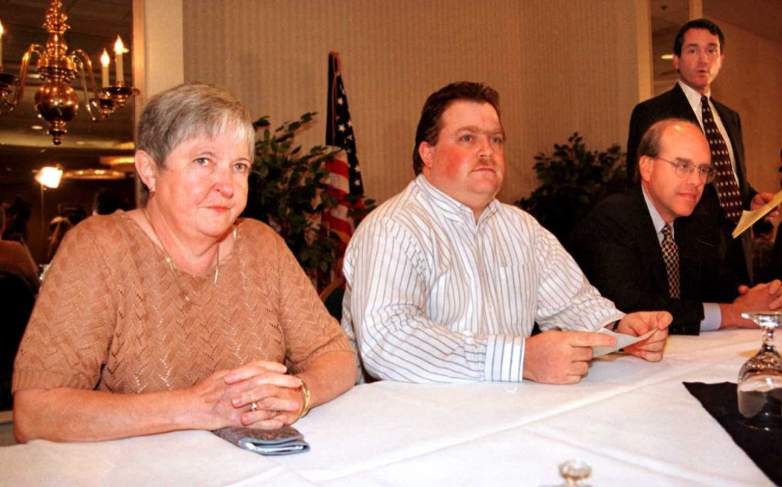
GettyRichard Jewell (C) his mother Barbara (L) and attorneys Watson Bryant (R) and Wayne Grant (far R) look on during a press conference 28 October in Atlanta, Ga. Jewell was cleared as a suspect in the July 27 bombing of Centennial Olympic Park.
According to an Associated Press story from July 29, 1996, the bomb killed a woman and injured more than 100 people. She was Alice Hawthorne, 44, of Albany, Georgia. Her daughter was also injured. A Turkish cameraman also died from a heart attack while rushing to the scene. It was described as a “crude pipe bomb.”
By July 30, 1996, news organizations were reporting that Jewell had emerged, in the words of an Associated Press story, “as the prime target” of the FBI investigation.
The article said that Jewell was “mobbed by reporters as he returned home from FBI questioning.” He declared, “I’m innocent. I didn’t do it.” He lived in an apartment with his mother and their two dogs.
The article called Jewell “a beefy 33-year-old with a checkered law enforcement career” who had appeared on the Today Show “to recount his heroic deeds.” It reported that his name “was splashed across Page 1 of an extra edition of the Atlanta Journal-Constitution: ‘FBI suspects ‘hero’ guard may have planted bomb.’”
The AP article said that Jewell worked for a security company that was hired by AT&T to provide guards for its Centennial Olympic Park pavilion.
The AP story says that Jewell was credited with “spotting an unattended olive-drab knapsack near the AT&T pavilion. Bomb experts quickly determined that the knapsack contained a crude pipe bomb, and while police were clearing the area, the bomb exploded.”

GettyThis dawn 27 July photo shows the five-story sound tower (L) in the Atlanta Centennial Olympic Park where a bomb exploded early 27 July during a rock concert.
Indeed, a man did call 911 “from a pay phone three blocks from the park and said a bomb would go off in 30 minutes.” That was 25 minutes before the bombing. It later turned out that the real bomber Eric Rudolph placed that call.
Ron Leidelmeyer, an NBC technician, told AP at that time – three days after the bombing – that he saw Jewell before the bombing and believed it would have been “difficult, if not impossible” for Jewell to have time to both plant the bomb and make that call. He said that Jewell was looking at the knapsack at 12:53 a.m. and the 911 call was at 12:58 a.m., which gave Jewell five minutes to make it to the phone booth, which Leidelmeyer said was “just not possible.” Leidelmeyer had log books to back up these times, but that didn’t stop the FBI, and subsequently the media, from fixating on Richard Jewell as a possible suspect.
In 1998, the New York Times reported that Jewell’s lawyer Watson Bryant filed a lawsuit on behalf of Jewell’s mother against the FBI. It says that the FBI searched Bobi’s underwear and her Tupperware containers. They even took a Mary Poppins video. He obtained settlements from CNN and NBC after suing them.
An Associated Press story from July 13, 1997 describes the effect on Jewell. “His career aspirations and social life are over and his good nature has been replaced with paranoia and distrust,” it reads.
He wasn’t cleared by the Justice Department until October 1996. That article says the NBC settlement was over comments Tom Brokaw made on air. It was said to be for $500,000. Jewell bought a home with the money. He settled with CNN for an undisclosed amount. The Atlanta Journal-Constitution didn’t settle and eventually prevailed before an appellate court, which ruled that what the paper reported was substantially true at the time because it was true the FBI was focusing on Jewell.
In 1997, it’s true as the movie shows, that Jewell landed a job as a police officer with Luthersville, a small town hear Atlanta. The police chief told the AP that Jewell was “well qualified. He has experience. He has training. And, most of all, he wants to be a police officer.”
A 2003 article in the New York Daily News reported that Jewell later worked for other departments in Georgia towns and got married. Sadly, Jewell died at age 44 of heart disease worsened by Diabetes.
Watson Bryant
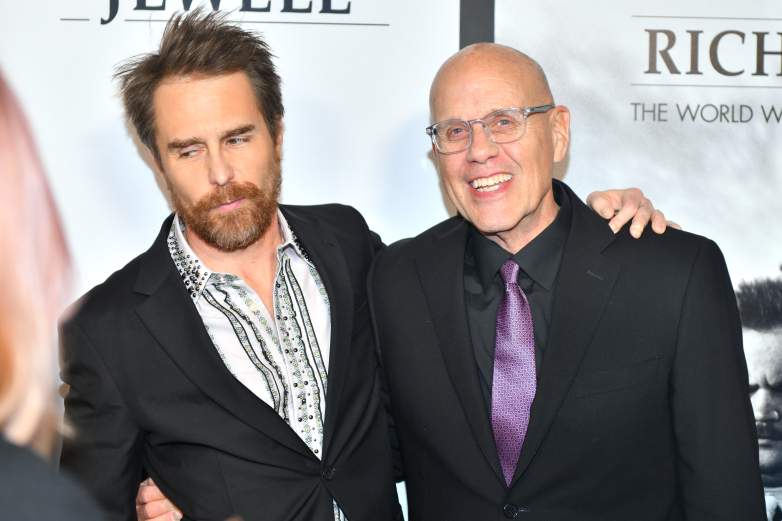
Sam Rockwell and G. Watson Bryant Jr. attend the “Richard Jewell” screening at Rialto Center of the Arts on December 10, 2019 in Atlanta, Georgia.
Jewell’s lawyer Watson Bryant is a real person. Watson Bryant told the AP in a July 30, 1996 article about the FBI search of Jewell’s mom’s apartment: “Quite frankly, we welcome this.” He predicted nothing would be found. Asked if Jewell should be named as a suspect, Bryant said, “No but he should be along with everyone else that was in the area when the bomb exploded.”
The 1997 Vanity Fair article on which the movie is partly based described how Bryant, in real life, did have to navigate through a phalanx of reporters to get into Jewell’s apartment. “He wore a baseball cap, khaki shorts, and a frayed Brooks Brothers polo shirt. He was 45 years old, with strong features and thinning hair, a southern preppy from a country-club family,” it reads.
He is still working as a lawyer in the Greater Atlanta area.
At the time, Vanity Fair reported, Watson Bryant “made a modest living by doing real-estate closings in the suburbs, but Jewell and his lawyer had formed an unusual friendship a decade earlier, when Jewell worked as a mailroom clerk at a federal disaster-relief agency where Bryant practiced law.”
The article added: “The simple fact was that Bryant had no qualifications for the job. He had no legal staff except for his assistant, Nadya Light, no contacts in the press, and no history in Washington. He was the opposite of media-savvy.” Bryant really did go on to marry Nadya.
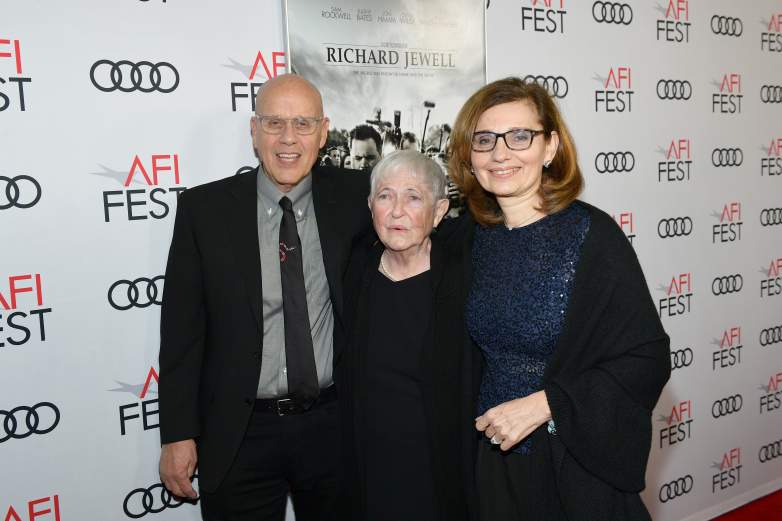
G. Watson Bryant Jr., Barbara “Bobi” Jewell and Nadya Bryant attend the “Richard Jewell” premiere during AFI FEST 2019 Presented By Audi at TCL Chinese Theatre on November 20, 2019 in Hollywood, California.
Even some of the tiny details in the movie are based on real life. For example, Jewell’s mother’s apartment really did prominently display a “portrait of Jewell in his Habersham County deputy’s uniform,” the Vanity Fair article reported.
An Associated Press story in the Scranton Times-Tribune, dated August 6, 1996, describes how Bryant explained to the news media that bombing fragments found in Jewell’s apartment were souvenirs. The lawyer’s full name is G. Watson Bryant.
On August 7, 1996, the AP was reporting that Bryant had declared, “Enough is enough. It’s time to stop being nice.” He explained that the FBI agents wanted Jewell to read the bomber’s statement from the call “12 different times.”
In real life, though, Bryant didn’t work alone for long. That article says that Jack Martin, “a more experienced criminal defense attorney,” had joined the team.
The Los Angeles Times reports that “Bryant and the Jewells remained close; for a time, Bobi even babysat for the lawyer’s two children.”
Bryant told the Times: “These bums [in the FBI] never had enough to arrest him — they had nothing but a bunch of BS taken out of context that they used to frame him up for a story that was too good to be true. Yet to this day people think he had something ugly to do with the bombing — when he’s the guy that, but for him, it would have been raining body parts when that bomb went off. I can’t imagine how many people are alive today and how many kids have been born just because Richard did his job.”
The FBI Agents & Their Investigation
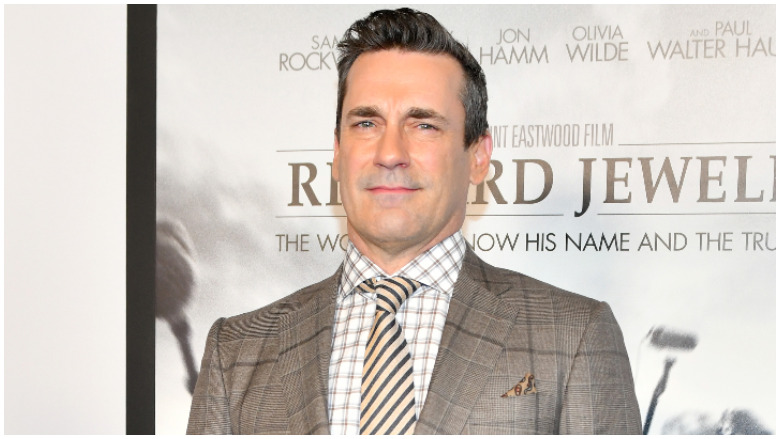
GettyJon Hamm plays Tom Shaw, the FBI agent investigating Richard Jewell in the new Clint Eastwood movie.
In the movie, Tom Shaw and Dan Bennett are the names given to the FBI agents relentlessly pursuing the former hero security guard turned suspect in the Atlanta bombing at the Olympics.
Tom Shaw and Dan Bennett are not real. Those aren’t the names of the real FBI case agents who pursued Jewell, Diader Rosario and Don Johnson. And there’s no evidence that either of the real-life case agents was reporter Kathy Scrugg’s source because she died having never revealed it. However, it’s true she got a tip from an FBI agent that Jewell was under investigation.
What is true, though, is that authorities in the FBI did aggressively pursue Jewell.
Tom Shaw and Dan Bennett appear to be loosely based on Don Johnson and Diader Rosario but are also composite characters, and some of it is completely fictionalized.
The Vanity Fair article on the case documents the FBI’s aggressive pursuit of Jewell. AJC says that the FBI kept Jewell under surveillance for months.
The article says that Jewell was questioned by FBI agents but was never charged and the Justice Department ultimately apologized to him.
In 1997, the FBI revealed that four FBI special agents in its Atlanta office were told they might face “possible disciplinary charges” for their roles in the Jewell case, according to The Washington Post.
The four were accused of “poor judgment” but not criminal wrongdoing. The four were identified as “Woody Johnson, who runs the Atlanta office; his deputy, A.B. Llewellyn; and special agents Diader Rosario and Don Johnson.” They were accused of trying to get Jewell to “star in a training video” that was really a ruse to see if he would incriminate himself.
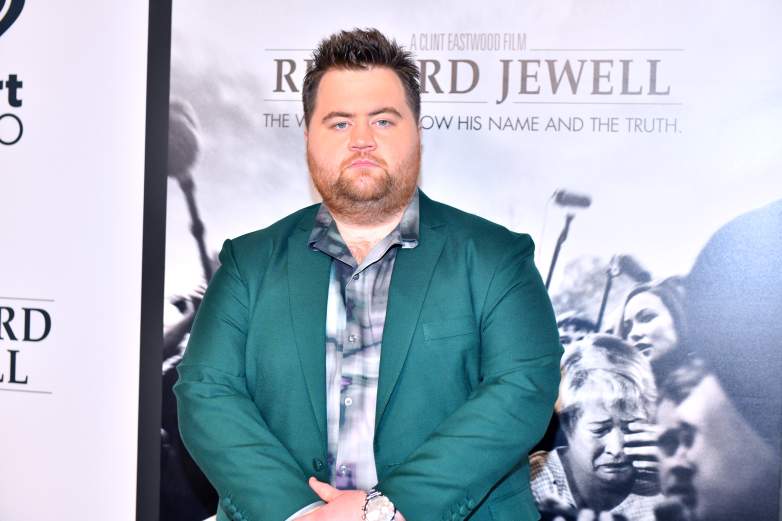
Paul Walter Hauser attends the “Richard Jewell” screening at Rialto Center of the Arts on December 10, 2019 in Atlanta, Georgia.
The Vanity Fair article describes how FBI agents Don Johnson and Diader Rosario knocked on Jewell’s mother’s apartment door and told him, “We need your help making a training film.” The next day, Rosario showed up with a search warrant.
Rosario, the article says, was “known for his skills as a negotiator” and “once helped calm a riot of Cuban prisoners in Atlanta.” But Johnson “had a reputation for overreaching” because of a 1987 Albany New York investigation of that community’s then mayor. The mayor was exonerated eventually but argued that the scrutiny cost him a federal judicial appointment, according to Vanity Fair.
“I’ve been doing criminal defense work for 20 years,” said Jewell’s lawyer, Jack Martin of the training video Jewell ruse to The New York Times, “and that was the most outrageous interviewing technique I’ve ever seen. It’s indefensible. It was obviously an invalid waiver.”
The bombing occurred July 27, 1996, and three days later, “On July 30, FBI agents Don Johnson and Diader Rosario asked Jewell to follow them to FBI headquarters to participate in a training film,” the newspaper reported, citing Jewell’s lawyer. In real life, Louis Freeh, the former FBI Director, ordered the agents to read Jewell his rights, which ended the training video conversation.
There is an actor who plays Rosario in the movie, but that’s not the Tom Shaw or Dan Bennett character, according to the IMDB cast list for the Eastwood film.
According to Real Clear History, Rosario in real life was also the agent who obtained a search warrant to get Jewell’s hair for testing.
Journalist Kathy Scruggs

Getty/FindaGraveKathy Scruggs cause of death is a sad one.
The movie makes journalist Kathy Scruggs into a pretty one-note villain. In real life, she was a lot more complex than that. It’s true that she was a reporter for the Atlanta Journal-Constitution newspaper when the bombing occurred, and it’s true she broke the story that the FBI was looking at Jewell.
“She was proud the FBI called her about Jewell. She was proud of the way she reported it to begin with,” her brother Lewis Scruggs told AJC. But he said she never told him who the source was, either.
Kathy Scruggs’ life is portrayed – falsely, her supporters say – in the movie. Today, she is not here to tell her side of the story, played on screen by Olivia Wilde. Scruggs’ newspaper has defended its reporting as accurately reflecting the state of the FBI’s investigation at the time; the FBI was investigating Jewell in the bombing, although he was completely exonerated.
Relative Nancy Scruggs Dyleski wrote on Facebook: “It is shocking that not one person from this film reached out to anyone in Kathy’s family even after we reached out to them on a couple of different occasions. I guess that they knew that their false narrative would have been shot down by people that actually knew her best. Shame on Olivia Wilde and Clint Eastwood, way to lie about someone that isn’t alive to defend herself. Kathy may be gone, but she is still a vibrant part of our family and we love her very much.”
In a book on the case called The Suspect, Scruggs is described as “a delightful throwback to the 1930s newspaper wars. Kathy never quietly entered a room, she exploded into it.”
A woman who knew her wrote on Kathy’s relative’s Facebook page, “I remember Kathy from Athens Academy days! She was a good bit older than me, but I admired her beauty, spunk, and charisma! Don’t let these Hollywood pretenders get you down!!”
Doug Monroe, who knew and worked with Scruggs, described her in a 2003 article in Atlanta Magazine as having a “raucous sense of humor.” He wrote: “Cops still talk in amazement about her bravado. She once beat the police to a murder scene and brazenly crawled in through a back window.”
“Where have you been?” she demanded to police, Monroe wrote, adding, “She was blonde and wore mini skirts and gaudy stockings. She smoked. She drank. She cursed. She flaunted her sexuality. She dated Lewis Grizzard. She dated an editor who allegedly beat her with a telephone. She dated cops, including one who was accused of stealing money from the pockets of the dead.”
Scruggs died five years after the controversy. Friends said she never recovered from it. Kathy Scruggs was born on September 26, 1958 and died September 2, 2001, age 42, in Cherokee County, Georgia. She is buried in Oconee Hill Cemetery in Athens, Georgia.
Heavy.com obtained the coroner’s report. Scruggs died of a drug overdose, specifically, “acute morphine toxicity.” Contrary to some other news reports, the coroner could not determine whether it was an accidental one or suicide.
“Kathleen Scruggs died as a result of acute morphine toxicity,” the report says. “…toxicological testing of chest fluid revealed a potentially lethal level of morphine. Also present in the chest fluid were paroxetine, mirtazapine, and ethyl alcohol. All of the ethyl alcohol may have been produced by the postmortem decomposition process. Findings at autopsy included severe coronary artery atherosclerosis (blockage of blood vessels that supply blood to the heart), which may have contributed to death…no acute traumatic injuries were identified.”
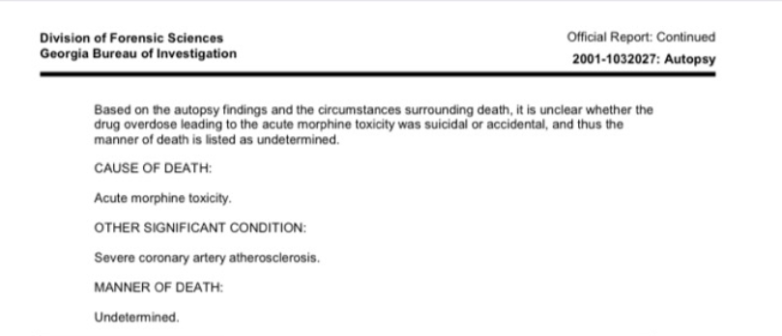
Kathy Scruggs autopsy report.
The report concludes: “It is unclear whether the drug overdose leading to the acute morphine toxicity was suicidal or accidental, and thus the manner of death is listed as undetermined.”
An autopsy was performed in September 3, 2001. The items present with the body were a television remote control, a sheet, a blanket and a comforter. Scruggs was wearing a “gray short-sleeved tee shirt with the green inscription ‘ATLANTA MOTOR SPEEDWAY’” and a pair of panties.
You can learn more about her cause of death here.
Scruggs’ obituary in The Atlanta Journal-Constitution explained that she had “suffered a variety of health problems for the past year.”
“I would characterize her as a very good reporter who was very fair,” Atlanta Police Chief Beverly Harvard told the newspaper. “She called the shots as they were, be it good or bad. She didn’t show favoritism. She was accurate.”
The newspaper’s publisher Roger Kintzel said in that story, “…nothing was ever found that indicated that what Kathy wrote was not the truth. She died knowing that what she wrote was accurate, and I think that was really important to her. She felt confident that that would be proven in court.”
Scruggs’ brother told AJC she was on medications for a variety of things, including Crohn’s disease. “Her heart gave away. It was just hard living,” her brother said to the publication. Lewis Scruggs added, “Her choice of boyfriends was not great,” he said. “She spent all the money she had and more and would go into the depths of depression.”
The headline on the original story was, “FBI suspects ‘hero’ guard may have planted bomb.”
The 1997 Vanity Fair article by Marie Brenner described in detail how the story happened. It reported that Scruggs had “good contacts in the Atlanta police, and she was tough” but one former staff member called her a “police groupie” to Vanity Fair, and an editor, while praising her talents, told Brenner: “Kathy has a hard edge that some people find offensive.” The story also describes the subsequent media frenzy, which extended far beyond AJC, and the FBI’s initial pursuit of Jewell.
It says that there was debate in the newsroom over the story and CNN had already decided to hold it. Meanwhile, Kathy Scruggs, a police reporter, “who had allegedly gotten a tip from a close friend in the F.B.I., got a confirmation from someone in the Atlanta police,” Vanity Fair reported. One controversial line reported by AJC: “Richard Jewell . . . fits the profile of the lone bomber.” The story had a double byline, Scruggs and Ron Martz.
Scruggs has her defenders who are criticizing the Eastwood movie for falsely making it appear that Scruggs offered to have a sexual relationship with the FBI agent who tipped her off.
In a bar, the FBI agent tells Scruggs, “Kathy, you couldn’t f*ck it out of them. What makes you think you could f*ck it out of me?” There’s no evidence that ever occurred, and Scruggs’ supporters say it didn’t.
Poynter.org wrote that “There is no evidence that Scruggs slept with anyone to get the story. Furthermore, Scruggs can’t defend herself. She died in 2001 at the age of 42 from an overdose of prescription pain pills for a chronic back problem.”
Riley said in a statement to IndieWire that “there is no evidence that this ever happened.”
Bobi Jewell, Richard’s Mom
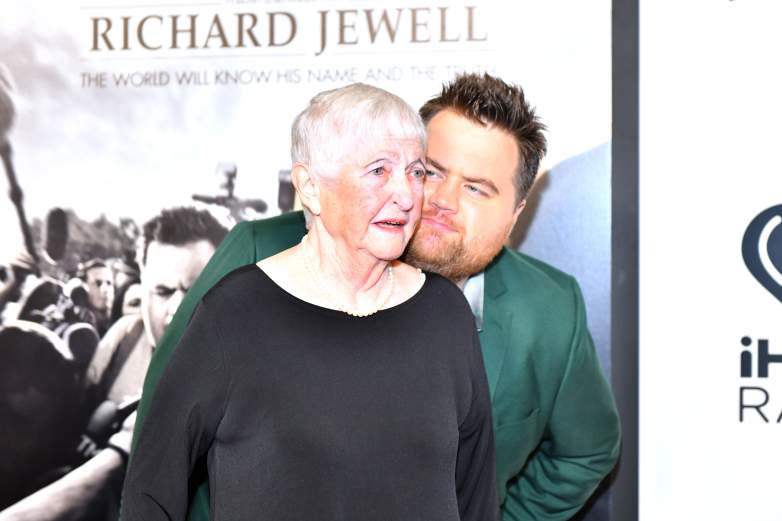
GettyBarbara “Bobi” Jewell and Paul Walter Hauser attend the “Richard Jewell” screening at Rialto Center of the Arts on December 10, 2019 in Atlanta, Georgia.
Richard Jewell’s mom, Barbara “Bobi” Jewell is a prominent character in the movie, played by Kathy Bates. The portrayal tracks closely with real life, even down to the Tupperware that Bobi got back from the FBI with marks on it.
Today, Bobi is still alive. She is 83 years old and still living in Georgia. In fact, she spoke to Paul Walter Hauser, the actor who plays Richard, before the movie was completed. A woman who knows her wrote recently on Facebook of Bobi Jewell: “Bobi Jewell is the nice lady at my church who works with the Operation Christmas Child shoeboxes. I am looking forward to seeing this movie although I am still saddened by the tragedy.”
The Hollywood Reporter spoke to Paul Walter Hauser, who plays Richard Jewell, about what it was like to meet Bobi Jewell. “The first time I met Bobi Jewell was on the Warner Bros. lot,” he told THR.
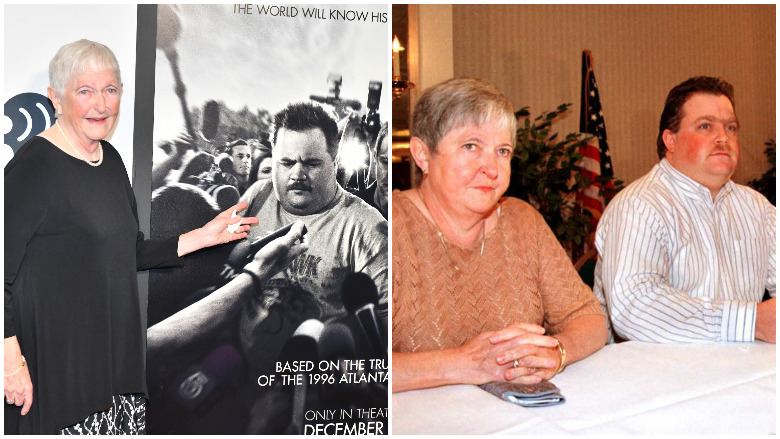
GettyRichard Jewell with his mother, Bobi Jewell.
“I was more nervous about meeting Bobi than I was Clint, because Clint and I have a certain commonality based on what we do for a living. With Bobi, our commonality was telling the story of this tragedy. I was worried, but she gave me a lot of tidbits and little nuggets of Richard that were indicative of greater truths.”
Hauser says Bobi told him, “You look just like Richard. You’re doing things like him that you don’t even know you’re doing.” She even brought treats to the set, THR added.
The 1997 article in Vanity Fair on the Richard Jewell case gives extensive details on the effect on Bobi at the time. Once, the Vanity Fair article reports, her cat jumped on a window ledge and photographers camped outside “began frenetically shooting pictures.”
“If my mom and I had something we wanted to talk about that we didn’t want anyone to hear, we wrote it on pieces of paper. When she left to go to work the next day, she would take it with her, tear it up, and put it in the trash! That is how I kept my mother informed about what was going on with the case,” Jewell told Vanity Fair.
To Vanity Fair, Richard Jewell described how people would “holler obscenities at her (Bobi). They would yell, ‘Did he do it? Did he blow those people up?’ They would yell, ‘You should both die.’ All she was trying to do was walk her dog.”
Jewell’s father was Bobi’s first husband, a Chevrolet worker named Robert Earl White, according to Vanity Fair. The marriage resulted in divorce. Her second husband John Jewell adopted Richard. That marriage eventually broke up too, and Jewell felt abandoned.
The Real Bomber
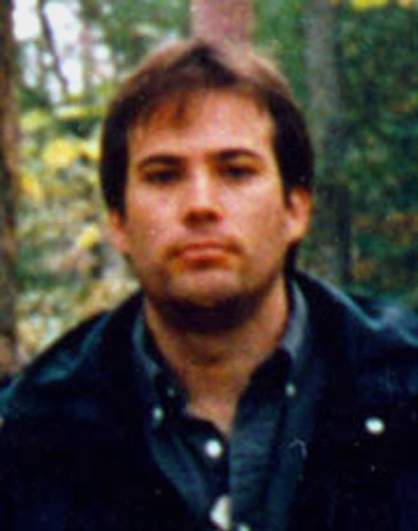
GettyEric Robert Rudolph, seen here in an undated photo, is the one-time carpenter who vanished in early 1998 and vaulted to the FBI’s Most Wanted list after a bombing at a Birmingham, Alabama abortion clinic.
Richard Jewell didn’t do it. Eric Rudolph did, as the movie shows. An anti-government extremist, Rudolph was convicted of perpetrating the bombing at the Atlanta Olympics.
Where is Eric Rudolph now? Today, he is serving a life prison term at Florence ADMAX USP. That’s a federal prison in Colorado. He is today 53 years old. Rudolph was responsible for a series of bombings. According to the FBI, “He pled guilty and is currently serving multiple life sentences without the possibility of parole.”
What were Rudolph’s motives for the bombings? Former FBI executive Chris Swecker explained on an FBI website devoted to Rudolph’s capture: “He had borrowed ideas from a lot of different places and formed his own personal ideology. He clearly was anti-government and anti-abortion, anti-gay, ‘anti’ a lot of things. The bombings really sprang from his own unique biases and prejudices. He had his own way of looking at the world and didn’t get along with a lot of people.”
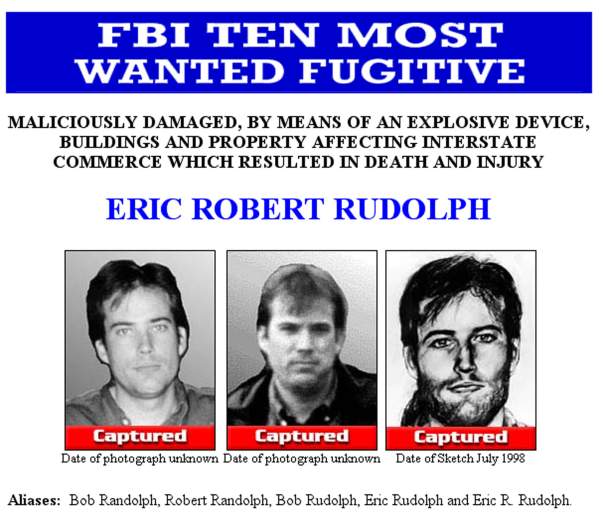
GettyFederal Bureau of Investigations Ten Most Wanted Fugitive Webpage shows fugitive Eric Robert Rudolph.
When he pleaded guilty, a “defiant Rudolph said he had no remorse or regrets,” the FBI wrote. Rudolph ultimately confessed. You can read his full confession here. “Abortion is murder. And when the regime in Washington legalized, sanctioned and legitimized this practice, they forfeited their legitimacy and moral authority to govern,” it says in part.
According to the FBI, between 1996 to 1998, “bombs exploded four times in Atlanta and Birmingham, killing two and injuring hundreds and setting off what turned out to be a five-year manhunt for the suspected bomber Eric Robert Rudolph.”
The law caught up with Rudolph in 2003. On May 31, 2003, former FBI Top Ten Fugitive Eric Robert Rudolph “was arrested by police officer J.S. Postell while rummaging through a trash bin behind a rural grocery story in Murphy, North Carolina,” the FBI explains.
“A skilled outdoorsman, Rudolph had managed to elude law enforcement officials for five years while hiding out in the mountains after bombing four sites in Georgia and Alabama. Rudolph began his violent attacks on July 27, 1996, when he planted a backpack containing a bomb in crowded Centennial Olympic Park in Atlanta, Georgia.”
According to the FBI, a woman who traveled with her daughter to watch the 1996 Summer Olympics “was killed and more than 100 others were injured in the blast. Shortly after, Rudolph bombed two more locations in Georgia and one in Birmingham, Alabama, resulting several more injuries and the death of a police officer. Rudolph ultimately told authorities where he’d stashed an additional 250 pounds of dynamite.”